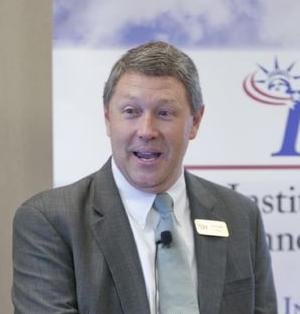
Tom Giovanetti is president of the Institute for Policy Innovation (IPI), a 38-year-old conservative, free-market public policy “think tank” based in Dallas, Texas.
In addition to his administrative and fundraising duties, Tom writes for IPI and for leading publications on a variety of policy topics including tax policy, economic growth, self-government, civil liberties and constitutional protections, judicial supremacy, intellectual property, Social Security personal accounts, technology and Internet policy, and government spending. In addition to being regularly published in major outlets including the Wall Street Journal, Washington Times, FoxNews.com and The Dallas Morning News, Tom writes often for the Fort Worth Star-Telegram. Tom frequently appears in the media and is a regular guest and occasional substitute host of the Mark Davis Show in the Dallas-Fort Worth market.
Tom loves thinking out-of-the-box to design novel solutions to policy problems and explaining complicated policy issues in ways average folks can understand.
Tom's mission at IPI is to use issues to teach conservative, free market thinking and to push back against unprincipled populism. He seeks to encourage continued skepticism of Big Government, to maintain faith in markets, and to defend individual liberty as the best means of achieving human flourishing. His most recent work has focused on free market solutions to student loan debt, preserving online freedom, and persuading state legislatures to override local and municipal rules that restrict economic liberty.
Mr. Giovanetti has represented IPI at many national and international organizations, including the World Intellectual Property Organization (WIPO), the Internet Governance Forum (IGF), and represented IPI during negotiations on the Trans-Pacific Partnership (TPP) trade agreement. Mr. Giovanetti is a popular speaker and writer and testifies before state and federal legislative committees on a variety of topics.
Follow Tom on Twitter (X) at @tgiovanetti
Coalition Letter to FCC Regarding Transition to IP-Based Services
Time for Blunt Tools
Because Congress and the president have failed to rein in federal spending, their sequester is a laudable "blunt tool" that should be celebrated, not feared. Sequester spending reductions are minuscule, so the whining of the Government Class should be ignored. And if our federal government doesn’t get its act together, we should employ more such blunt tools.
Georgia Bill Stirs Fight Over Municipally Owned Networks
Georgia's House Bill 282 is reigniting controversies and conversation on whether states should limit municipal broadband networks.
Sequester Sanity
Embrace the sequester as the first meaningful restraint on federal spending in almost twenty years. In fact, let’s start planning the next one.
President Price Hike
Unlike typical government meddling in prices, President Obama’s policies always seem designed to make prices higher.
Who's Afraid of the Sequester?
Any politician who can’t stomach the sequester cuts—which aren’t nearly large enough to put us on a sustainable fiscal path—isn’t serious about restraining federal spending. Let the sequester happen.
Dodge 'farmer' ad wins pundit praise
If there was one ad that seemed to spark the greatest sense of Americana among some politicos, including IPI president Tom Giovanetti, it was Dodge’s commercial that used audio from the late conservative radio broadcaster Paul Harvey.
Comments to the FCC Urging Test Migrations from PSTN to IP-based Networks
IPI urges the Federal Communications Commission (FCC) to do its part to speed the transition from the legacy PSTN to IP-based networks by allowing test migrations in specific geographic areas, and by reforming several other archaic regulations.
From Throwing Pies to Eating Crow
Mark Lynas, leader of the movement against genetically modified crops, has embraced the technology and apologized for his misguided efforts.
Freezing Out the Deficit
A real, across-the-board federal spending freeze, exempting nothing, would balance the budget without tax increases and would equalize the sacrifice without pitting special interests against each other.





